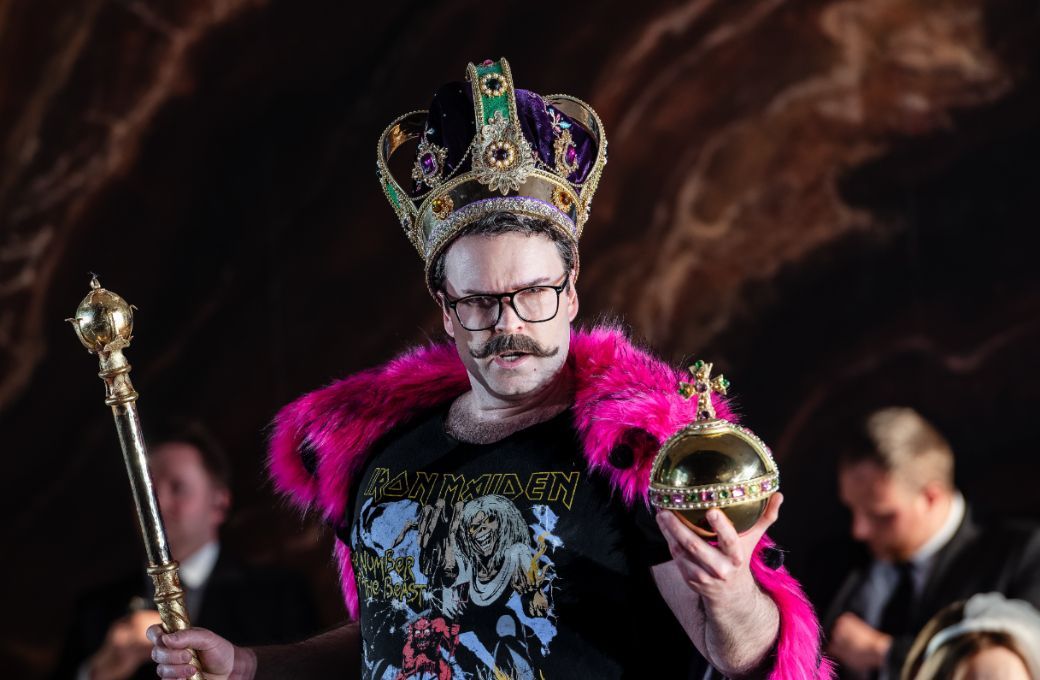Verdi’s second opera, Un giorno di regno (King for a Day) flopped horribly at its 1840 premiere and has been little performed ever since. The next time Verdi would turn his hand to comedy would be half a century later, with his last opera, Falstaff. So there was an obvious question for anyone heading for Garsington Opera last night: is Un giorno an unjustly neglected gem? Or is it a curiosity piece at best, served up for Verdi fans to tick off their bucket list?

The plot is extremely silly (although perhaps no more so than many opere buffe). King Stanislaus of Poland is travelling secretly from exile in France to reclaim his throne. He has instructed our hero Belfiore, an officer in his army, to impersonate him: the idea is to throw his enemies off the scent until Stanislaus has safely reached Warsaw. This gives Belfiore the opportunity for some delightful mischief-making but turns out to be unhelpful to his love life, since his host, the oafish Baron Kelbar, is the uncle of his beloved, the Marchesa del Poggio, who is decidedly unimpressed by her lover appearing to ignore her. After the usual opera buffa shenanigans, all ends well with a double wedding.
The material might sound unpromising, but that doesn't seem to bother director Christopher Alden, who takes the audience on a comic roller coaster from the very first minute. The Baron is incarnated as a defence industry magnate and his servants are all dressed as sunglass-wearing, gun-toting secret service bodyguards à la Men in Black. Choreographer Tim Claydon gets them performing hilarious but beautifully crafted dance moves, while Belfiore is being camped up in a crown, mantle and sceptre outfit that would have graced Freddie Mercury, stick on twirly moustache to boot.
The visual gags keep flowing, and they hit the mark, starting with the TV news broadcast (“Forte News, always forte, always in 4/4”), which is a brilliant device for getting the audience to follow the opaque plot twists. Gags follow about airport security, the Polish football team, the military-industrial complex, social media and more, complete with a proper slapstick food fight done with exquisite timing.
Conductor Chris Hopkins (replacing Tobias Ringborg) and the Philharmonia Orchestra brought just as much devil-may-care vitality to Verdi’s music, which sounds like turbocharged Rossini – the rum-ti-tum upbeat rhythms, the crescendi and the pure energy, the same lightness of touch – but with hints of a heavier, more imposing timbre that point you firmly in the direction of Verdi’s later career.
Something quite this silly only works if the cast and chorus commit to it fully, and you could see that this cast were lapping it up and giving their all. Henry Waddington and Grant Doyle did a splendid little-and-large double act as the Baron and his intended son-in-law La Rocca (elderly but rich). As well as relishing the comedy, Waddington and Doyle gave us unusually strong buffo patter duets, the articulation of the text clearly audible above the orchestra, even at the fastest pace. Oliver Sewell and Madison Leonard made an attractive young couple as Edoardo and Giulietta, with Sewell showing a fine light tenor with no fear of the high Cs. Joshua Hopkins was an urbane, authoritative Belfiore with a super-smooth baritone timbre. But the pick of the singers was Christine Rice as the Marchesa, a sassy and fun stage presence, with a delicious timbre throughout her range and truly astounding in her low register. Her entrance aria, “Grave a core innamorato”, was a barnstormer.
The action never flagged, the ensemble pieces shone and the chorus made a splendid sound in spite of their small number. To a certain extent, Alden is lampooning the genre, but he does it with such a deft and loving touch that you can’t help but be won over. Look out for the cabaletta that follows Edoardo’s “amici cari”, done as a karaoke number with various chorus members joining in the fun.
So is Un giorno di regno an unjustly neglected gem? Probably not, but I didn’t care. Alden and his cast generated so much fun on stage, the choreography was so sharp and the music was played and sung with so much beauty and energy that my critical faculties were completely suspended as I was carried along for the ride. Far from merely ticking an entry in the “Verdi operas I have now seen” list, this was a proper treat.


